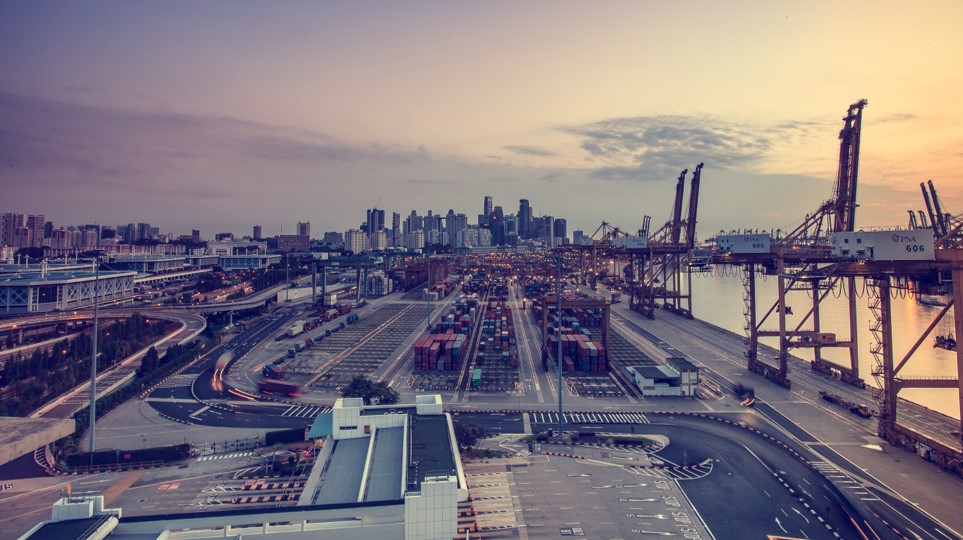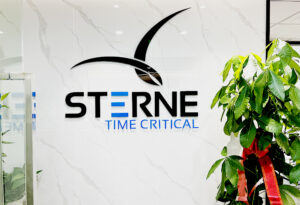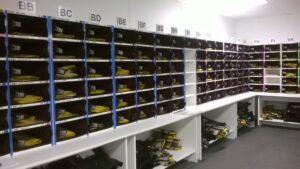As a direct consequence of the standardization of the offers proposed by the major transport consortiums and the evolution of customer expectations, customized transport is now growing rapidly. It is the essential link that gives shippers’ supply chains all their flexibility and efficiency.
As the leader in this segment, the STERNE Group has been able to bring together a range of complementary skills – regular transport, urgent and dedicated transport, transport of sensitive products (luxury, health, high tech), urban shopping and distribution, local logistics, courier solutions – which today enable it to deliver a differentiated service and give its customers a decisive competitive advantage.
This is a major challenge when you consider that logistics has become a key element in shippers’ performance.
1. The customized transport market continues to grow
According to forecasts made by the International Transport Forum at the OECD [1], international freight volumes will increase more than fourfold by 2050. The distance travelled will increase by an average of 12% for all modes of transport combined.
The evolution of transport demand could increase from 2,428 million tons in 2012 to 3,256 million tons in 2030, an average annual increase of 1.6%; international transport will see an even more marked increase, with an annual increase of 2.2%.
The customized transport market is also benefiting from this trend: out of a transport market estimated at 300 billion euros in Europe, it has grown by 33% in 10 years and is now worth around 3 billion euros.
2. Consumers’ expectations are changing
The logistics sector continues to evolve, shaped by the changing expectations of customers. Companies and individuals alike are increasingly turning to personalized, responsive offerings that include a range of high value-added services.
The search for the “all in
More and more customers are turning to service providers who offer a comprehensive range of services and geographical coverage. The ability of the service provider to manage all aspects of an order has become a determining factor in the purchasing decision. All-in services, which can include temporary storage, packaging, labeling, order preparation, customs formalities or even the connection or installation of a device, are very popular with customers.
Proximity and internationality
Operators have to face a double phenomenon: a growing demand for proximity on the part of consumers, coupled with an increased internationalization of markets. In short, they must be able to pick up and deliver across the street and around the world.
Security and integrity of transported products
Fragile, heat-sensitive, bulky or heavy, luxurious or high-value, sometimes dangerous, the products or goods transported have their own characteristics. Whether it’s computer equipment, medical equipment, works of art, transplants, clinical trials or fresh produce, they all require attention, special care and appropriate transport conditions during their handling and delivery. In concrete terms, the challenge is to ensure their safety and respect their integrity.
Ever shorter delivery times
In the past, the need for rapidity was the prerogative of the assembly industries, especially the automotive and aeronautical industries. Today, the need for rapidity has spread to almost all sectors of activity. Factories, platforms, branches, stores, pharmacies and private individuals all want to be delivered as quickly as possible. Downstream logistics flows to large logistics platforms and distributors are also affected by this phenomenon: all orders must be fulfilled as quickly as possible.
Customized delivery
Consumers demand customized delivery, at the place and time that suits them. Today’s carrier must adapt to the customer’s schedule and be able to deliver ‘on demand’, where they are and at the time they choose. Adaptability to the customer’s wishes is increasingly shaping delivery models.
More and more traceability
More and more shippers want to know where their goods are and to be kept informed of the progress of the service. Thus, the circulation of information within the supply chain plays a crucial role, on the one hand to secure ongoing shipments, and on the other hand to satisfy consumers’ desire for transparency.
An appetite for connected solutions
The boom in e-commerce (over 100 billion euros in France in 2020) and new digital uses have shaken up traditional delivery patterns. To respond to these new behaviors, transport operators are no longer just selling transport services but also connected solutions and services.
The ecological imperative
The evolution of society towards a sustainable development model is forcing transport operators to rethink their logistics offer. Respect for the environment and the need for transparency are now key criteria for shippers and end customers alike. In other words, the economic performance of transport now depends on its eco-responsible performance.
Acting ethically
Today, the company must create a healthy work environment to strengthen the trust of all stakeholders: employees, customers, suppliers, partners and shareholders. Consumers are increasingly attentive to this and prefer to partner with companies that adopt ethical behavior in all their activities.
Financial strength: a necessity
At a time of economic, financial and health crises, shippers are looking for solid, long-term service providers that can guarantee sales, cash flow and debt levels. Because the very principle of a partnership, to be fruitful, is to be able to establish itself over the long term.
These requirements, which call for tailor-made solutions, are not arbitrary: the production of a factory, the continuity of a company’s service, the quality of care provided to a patient or the brand image of a professional often depend on them. In a word, logistics has become strategic, even vital, for many players and sectors of activity.
It is therefore essential for principals to be able to identify the right partner; the one who will be able to combine proximity and global reach, speed and reliability, know-how and sustainable development to bring them the added value they are looking for.
These objectives are sometimes difficult to achieve in a fragmented sector, marked by a high degree of disparity between companies: 97% of the 37,200 French transport companies surveyed in 2017 had fewer than 50 employees and only 0.2% of them had more than 250 employees [2]. With 1,100 employees, a turnover of €213 million in 2019 and a global offering, the STERNE Group is an exception.
3. STERNE, a global player that ticks all the boxes
To meet changing market expectations, the STERNE Group bases its strategy on its ability to provide all its customers with a tailor-made transport solution, based on listening to and taking into account their needs, accurately understanding their challenges and implementing an ad hoc service that meets their imperatives.
■ Customized services, STERNE’s DNA
Luxury and health products, regulated, sensitive, dangerous, high-value, heavy or oversized goods, the STERNE Group has made customization its area of excellence. The Group offers high value-added all-in turnkey solutions that include à la carte services such as storage, labeling, packaging, handling, order preparation, customs formalities management and reverse logistics.
To deliver a tailor-made service, the STERNE Group relies on the complementary know-how of its 5 subsidiaries:
- STERNE Regular (TCS, 100% Express), the French leader in H+ regular precision transport
- STERNE City (NOVÉA), a major player in last-mile logistics and delivery
- STERNE Time Critical (ATS), specialist in urgent and sensitive transport in Europe and worldwide
- STERNE Care (ATS Santé), the preferred partner of the medical sector in France, Europe and worldwide
- STERNE Express (BBC, Partner express), a partner specializing in customized transport
"Thanks to our subsidiaries, we are able to provide a customized transport offer. Our teams must be able to respond to all specific requests. Our culture is to intervene in cross-functional operations and provide a high value-added service to our customs
explains Daniel DESAGE, President of the STERNE Group. Tweet
Our objective is to deliver a differentiated service and provide our beneficiary customers with a major competitive advantage.
■ Proximity and global coverage
Organized on an international scale, the STERNE Group has built a capillary model capable of combining power and proximity. Thanks to its networks of agencies and partners, it is able to collect and deliver goods, with the same level of requirement, anywhere in the world.
Objective: to be as close as possible to all our customers.
■ A global offer
STERNE is firmly positioned in its market as a Global Player, capable of handling all customised transport requirements whatever the :
– The nature of the flow: R&D, supply, production, inter-site, aftermarket, distribution and BtoC,
– The customer’s sector of activity: automotive, aeronautics, industry, service sector, luxury goods, health, trade and distribution,
administration and local authorities
– The type of operation required: optimize the delivery and collection of small parcels and spare parts for mobile professionals, urgently transport spare parts to a car manufacturer’s assembly line, transport blood samples for analysis laboratories, make regular deliveries of banking documents every day before 9:00 a.m. for a national network of agencies, organize express, air transport between China and Europe, deliver parcels by bicycle in the Paris region
Objective: to meet all our customers’ requirements, including the most specific.
■ A digitalized service
Customers today are looking for new technologies to benefit from better customer experiences.
The Group stands out from the competition thanks to its digitalized processes ( online orders, vehicle geolocation, physical and/or thermal
traceability, electronic signature…) and its new connected solutions in SaaS mode.
Objective: to enable our customers to manage their transport and mail activities independently.
■ An eco-responsible group
As we know, companies are now choosing transport service providers that are in line with their CSR policy. As an actor in civil society,
STERNE intends to fully play its role as a responsible company. Every day, the Group limits its CO2 footprint through strong commitments:
delivery by bicycle, multimodal or rail transport, optimization of flows and reduction of kilometers traveled, shared transport plan, driver
training, and maintenance and renewal of vehicles by hybrid and electric models.
In all these initiatives, the Group relies on the ECOVADIS system, which enables companies to assess their CSR practices in four key areas:
environmental, social, ethical and responsible purchasing. In addition, STERNE is responding to the problems of the first and last mile, which contribute significantly to congestion in urban centers, by focusing on new modes of transport such as platforms in urban areas or delivery by drone.
Our goal is to help our customers reduce their carbon footprint.
To remain competitive and meet new consumer demands, more and more shippers are opting for agile logistics, a guarantee of flexibility and performance. Large groups and SMEs are now banking on tailor-made Transport & Logistics partners, capable of providing them with ultra-customized services that meet their specifications and enable them to provide real added value to their own customers.
→ Discover all the competitive advantages of the STERNE Group













